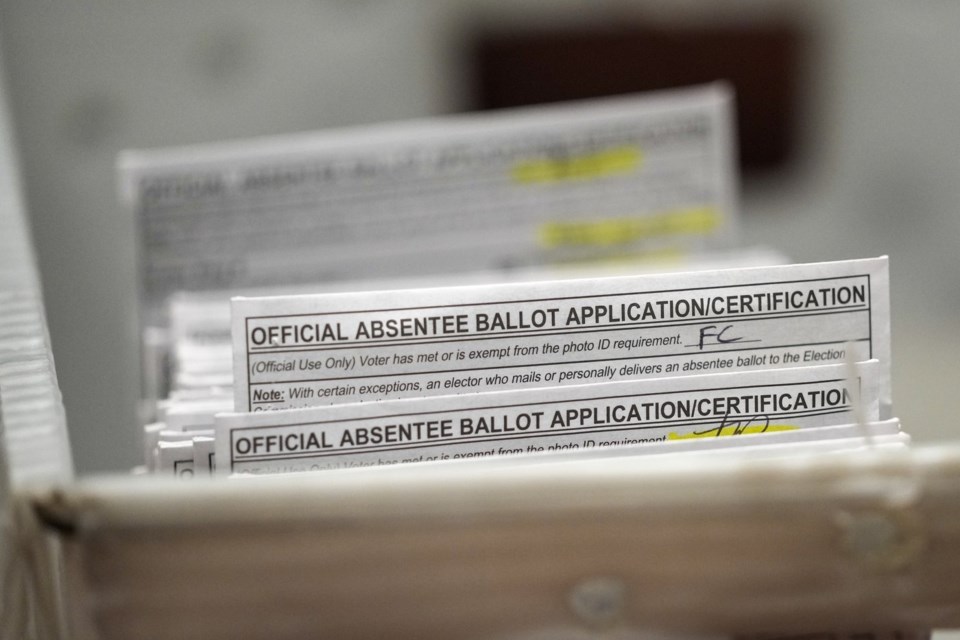MADISON, Wis. (AP) — A “confluence of errors” including unlawful actions by the former clerk in Wisconsin's capital city led to nearly 200 absentee ballots not being counted in the November presidential election, an investigation by the state elections commission released Wednesday concluded.
Maribeth Witzel-Behl resigned as Madison city clerk in April amid investigations by the city and the Wisconsin Elections Commission into the missing ballots. No outcome of any race was affected by the missing ballots.
The city's investigation, released in April, determined that Witzel-Behl didn’t break any laws but did violate multiple policies and her contractual duty to supervise elections and maintain professional standards.
But the elections commission report concluded that there is probable cause that Witzel-Behl broke five election laws. The election commission's investigation was not a criminal probe. Whether the former clerk is actually charged with any crimes would be up to the Dane County district attorney.
The elections commission report concluded that Witzel-Behl broke state law for failing to properly supervise an election; not providing the most recent current registration information for pollbooks in two wards; improperly handing the return of absentee ballots; not properly canvassing the returns as it pertained to the 193 uncounted ballots; and failing to provide sufficient information for the municipal board of canvassers to do its work.
“The failure to count the 193 ballots in Madison was a result of a confluence of errors,” the report concluded.
It determined that Madison did not have procedures to place to track the number of absentee ballots going to a polling place and there was a “complete lack of leadership” in the clerk's office.
Instead of working to solve the problem, Witzel-Behl went on vacation for weeks after the election, the report said.
“These ballots were treated as unimportant and a reconciliation nuisance, rather than as the essential part of our democracy they represent,” the report said.
The report also said that an “unauthorized person” was found sleeping in the building owned by Dane County and used by the city to store ballots. According to one of the workers at the facility, that person could have accessed the room where the security carts were stored.
On multiple occasions, workers found unlocked doors at the building, a former brewery near the Madison airport, the report said.
The report makes seven recommended orders for the city to comply with to improve its operations. The Wisconsin Elections Commission is scheduled to vote on whether to accept the report's findings and recommendations at its July 17 meeting.
Madison city attorney and acting clerk Michael Haas said in a statement that he hoped the report “can provide lessons that we and other Wisconsin clerks can learn to prevent similar errors in the future.”
The city has already implemented additional safeguards and procedures that were in place for elections earlier this year to ensure that all eligible absentee ballots are accounted for, Haas said.
He declined further comment until after the commission's vote on the report.
The elections commission investigation was led by Democrat Ann Jacobs, the commission's chair, and former chair Republican Don Millis. They are both attorneys. This marks the first time in the eight-year history of the commission that it has used its investigatory authority.
The investigation determined that two bags of uncounted absentee ballots likely never made it to the wards where they should have been counted.
Dane County canvassers discovered 68 uncounted absentee ballots in a tabulator bin on Nov. 12, a week after the election, and another 125 uncounted ballots in a courier bag the first week of December.
The clerk's office did not notify the Wisconsin Elections Commission of the oversight until Dec. 18, almost a month and a half after the election and well after results were certified on Nov. 29.
Witzel-Behl told investigators she wasn’t aware of any uncounted votes until the week of Dec. 10, even though she apparently sent an email to her staff on Nov. 27 to keep the ballots sealed and record the voters as having participated.
Four voters whose ballots weren’t counted have filed claims for $175,000 each, the first step toward a class-action lawsuit.
Scott Bauer, The Associated Press



